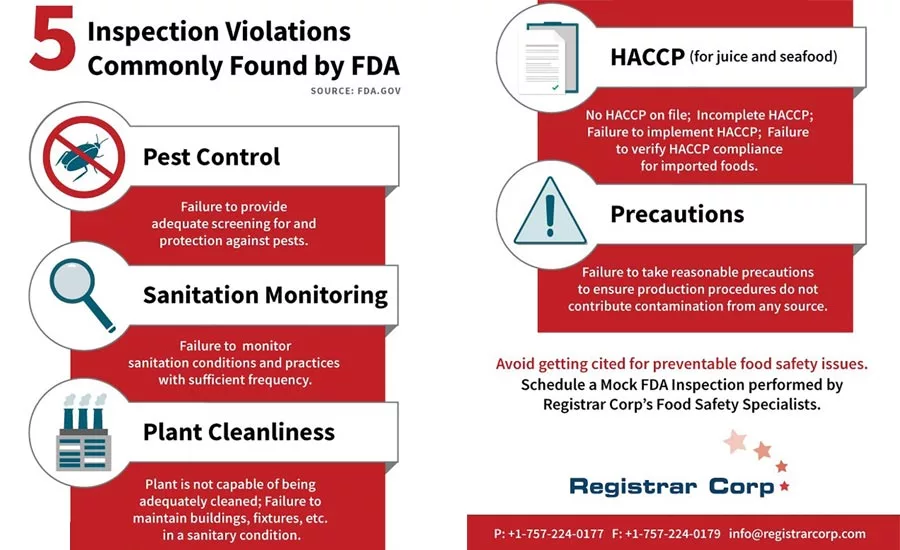FDA’s top 5 most commonly cited food safety violations
FY 2017 top violations are almost the same as those cited in FY 2016 and 2015.

The US FDA has released its inspectional observation data, which contains violations cited during routine food facility visits made from October 2016 to September 2017.
Registrar Corp., an FDA consulting firm, compiled a list of the most commonly cited food safety violations. Among the top five violations during the 2017 fiscal year were the following:
1. Pest Exclusion/Screening: Effective measures are not taken to protect food against contamination from pests or exclude pests from food production areas.
2. Sanitation Monitoring: Sanitation conditions and practices are not monitored frequently enough to satisfy current good manufacturing practices (CGMPs). For example, plants are lapse in checking: the safety of water coming into contact with food and food contact surfaces; the cleanliness of food contact surfaces; and cross-contamination prevention methods.
3. Plant Cleanliness: The facility either fails to maintain cleanliness of the premises or cannot do so due to its construction.
4. HACCP Plan Implementation: Seafood or juice processors fail to implement certain procedures in its HACCP plan, such as critical control points of food hazards or verifying the adequacy of the plan's hazard control.
5. Reasonable Precautions: Precautions are not taken to prevent production procedures from contaminating food, including not monitoring time and temperature of processed foods or not monitoring operations, such as freezing or heat processing.
Since these violations are almost the same top violations cited in FY 2016 and 2015, it is useful for food manufacturing operations to keep these in mind and pay particularly close attention to before an FDA inspection.
Looking for quick answers on food safety topics?
Try Ask FSM, our new smart AI search tool.
Ask FSM →
One change in this year’s reports from prior years is the cited violations of the FDA’s rules on Preventative Controls and the Foreign Supplier Verification Program (FSVP).
“Though not at the top of the list, the 2017 report is the first to include violations related to FDA's Preventive Controls Rules and FSVP Rule, both of which had compliance deadlines in 2017,” says Devon McClellan, director of marketing for Registrar Corp. “With the next FSVP deadline landing in March 2018, it is probable that FSMA violations may make their way to the top next year.”
Although many importers are required to have FSVPs already since the first compliance deadline was on May 2017, FDA doled out 108 citations for the failure of a company not developing this program.
As Registrar reminds food facilities, inspection violations can result in warning letters, placement on import alert, suspension of facility registration and other actions. For more information: www.registrarcorp.com
This article was originally posted on www.foodengineeringmag.com.









